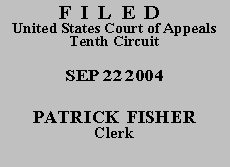

| MICHAEL EUGENE ASHBY,
Plaintiff-Appellant, v. MARK MCKENNA; RANDY TATE; CROWLEY COUNTY CORRECTIONAL FACILITY; CROWLEY CORRECTIONAL SERVICE LIMITED LIABILITY COMPANY; CORRECTIONAL SERVICES CORPORATION, Defendants-Appellees. |
|
Plaintiff Michael Ashby appeals from a district court order dismissing this action as a sanction for discovery abuse pursuant to Fed. R. Civ. P. 37(a)(2)(B). We review solely for abuse of discretion, Ashby v. McKenna, 331 F.3d 1148, 1149 (10th Cir. 2003), and, finding none, affirm for the reasons stated below.(1)
As the cite for our standard of review shows, this case has been here before. On the last appeal, another panel of this court vacated a prior order of dismissal under Rule 37(a)(2)(B), because one of the two grounds relied on by the district court for imposing the sanction was legally erroneous. Id. at 1150-51. The panel was careful to point out, however, that the other ground cited by the district court, involving plaintiff's recalcitrant opposition to proper discovery efforts, remained a sound basis for sanction and, accordingly, remanded the matter for the district court to freely reconsider the question of sanctions, including dismissal, on that ground. Id. at 1151. On remand, the district court once again concluded that dismissal was appropriate.
Plaintiff's argument on appeal is largely a misguided attempt to defend his uncooperative response to defendants' legitimate discovery requests. Without engaging in an extended recitation of facts well known to the parties, suffice it to say that plaintiff unduly hampered reasonable efforts to obtain his medical records for a time period plainly relevant to his prison civil rights claim for deliberate indifference. This court already made it clear on plaintiff's prior appeal that his conduct in this regard was "properly deemed unjustified" by the district court. Id. at 1151; see also id. at 1152 (noting that on remand dismissal "may yet be a permissible exercise of [the district] court's discretion in response to [plaintiff's] unjustifiable resistance to the discovery of his medical records").
The only real issue here is whether the district court's choice of the sanction of dismissal was a permissible exercise of its discretion. The magistrate judge and district court explicitly considered all of the controlling factors from Ehrenhaus v. Reynolds, 965 F.2d 916, 921 (10th Cir. 1992). We therefore defer to the result reached unless we have "a definite and firm conviction that the court below committed a clear error of judgment in the conclusion it reached upon a weighing of the relevant factors." Rains v. Ruplinger (In re Rains), 946 F.2d 731, 732 (10th Cir. 1991) (explaining abuse-of-discretion review in similar setting) (citation and quotation omitted). We see no such error of judgment here.
Plaintiff notes that defendants had obtained some of his medical records through other means and argues that they were thus not prejudiced by his conduct. This argument is meritless. The document plaintiff relies on, a letter from the state department of corrections to defendants' counsel, explicitly states that defendants were provided only records "starting the date of the incident (April 99)." R. doc. 50, Ex. C. It was defendants' reasonable position throughout the discovery proceedings that they needed medical records for a substantial period preceding the incident to assess whether medical symptoms that plaintiff claimed were caused by prison food eaten in April 1999 were actually attributable to a pre-existing condition. Moreover, it is prudent litigation practice to obtain a formal release for all relevant records, to confirm that records already in one's possession are comprehensive and complete, and resistance to such confirmation is itself prejudicial. The district court properly rejected plaintiff's effort to shift the primary focus of the inquiry onto defendants, and placed warranted emphasis on "[p]laintiff's failure to execute appropriate medical releases, [which] by itself, is a discovery abuse so grave that the ultimate sanction of dismissal is warranted under the Ehrenhaus factors." R. doc. 246 at 3 n.1.
In sum, the district court fully complied with the mandate from our earlier decision. It limited its consideration of sanctions solely to plaintiff's unjustified resistance to defendants' request for medical records, explicitly assessed all of the controlling factors set out in Ehrenhaus, and "exercise[d] its discretion anew" to dismiss the case. Ashby, 331 F.3d at 1151 (quotation omitted).
The judgment of the district court is AFFIRMED. Appellant's motion for recovery of costs and fees and for leave to supplement his pleadings is DENIED. Appellant's motion for leave to appeal in forma pauperis is GRANTED, and appellant is reminded that he remains obligated to continue making partial payments until the entire fee has been paid.
Entered for the Court
Circuit Judge
*. This order and judgment is not binding precedent, except under the doctrines of law of the case, res judicata, and collateral estoppel. The court generally disfavors the citation of orders and judgments; nevertheless, an order and judgment may be cited under the terms and conditions of 10th Cir. R. 36.3.
1. Plaintiff also complained in his opening brief that the district court had improperly ordered him to pay defendants' costs. As defendants subsequently pointed out, and our review of the district court docket sheet confirmed, no order for costs was ever entered (defendants apparently could have, but did not, seek costs under Fed. R. Civ. P. 54(d)).